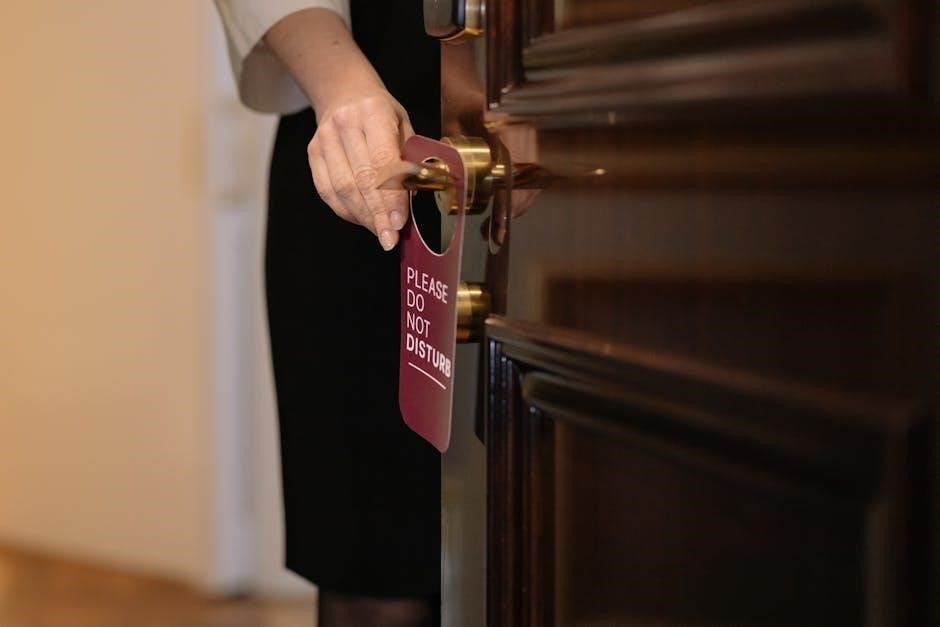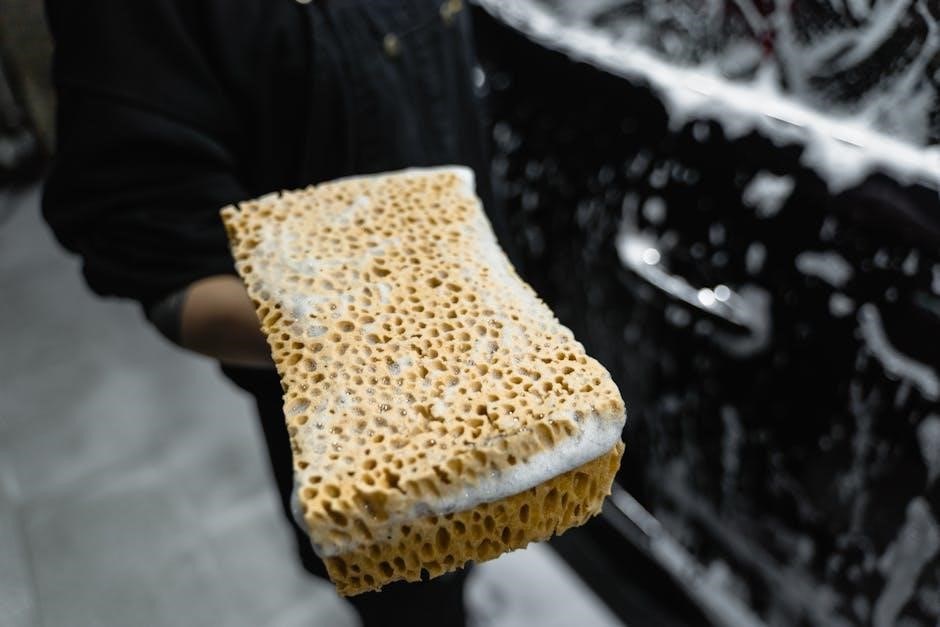The Cleaning Services Award Pay Guide provides a comprehensive resource for understanding minimum pay rates, classifications, allowances, and penalty rates in the cleaning industry. Updated annually, it ensures fair compensation and compliance with industry standards.
1.1 Overview of the Cleaning Services Award
The Cleaning Services Award is a legal document outlining minimum pay rates, classifications, and employment conditions for employees in the cleaning industry. It ensures fair wages, allowances, and penalty rates, applying to both full-time, part-time, and casual workers. The award is regularly updated by the Fair Work Commission to reflect industry changes and economic conditions, providing a clear framework for employers and employees to understand their rights and obligations. It serves as a vital resource for compliance and dispute resolution.
1.2 Importance of Understanding the Pay Guide
Understanding the Cleaning Services Award Pay Guide is essential for employers and employees to ensure compliance with legal requirements. It provides clarity on minimum wages, classifications, allowances, and penalty rates, helping employers avoid underpayment and employees verify their entitlements. Accurate knowledge of the pay guide fosters fair workplace practices, prevents disputes, and ensures adherence to industry standards. It is a critical tool for maintaining transparency and equity in the cleaning industry, benefiting both businesses and workers alike.

Who is Covered by the Cleaning Services Award
The Cleaning Services Award covers employees in the cleaning industry, including residential, commercial, and specialized cleaners, maintenance staff, and hygiene workers across various sectors.
2.1 Employees in the Cleaning Industry
The Cleaning Services Award applies to employees engaged in cleaning roles, including those in residential, commercial, and industrial settings. This encompasses janitors, maintenance staff, and specialized cleaners. The award ensures fair wages, penalty rates, and allowances for all covered workers, promoting industry-wide compliance and equitable compensation for their services.
2.2 Specific Roles and Job Titles
The Cleaning Services Award covers a range of specific roles, including janitors, maintenance staff, office cleaners, and industrial cleaners. It also applies to specialized positions like carpet cleaners, window cleaners, and ground maintenance workers. The award ensures these roles receive fair compensation, reflecting their duties and expertise. Employers must adhere to the pay guide to ensure compliance with minimum wage requirements for all covered job titles within the cleaning industry.
2.3 Exclusions from the Award
Certain roles are excluded from the Cleaning Services Award, such as managerial or supervisory positions earning above the specified threshold. Additionally, employees covered by enterprise agreements or other awards may not be subject to this award. Independent contractors and those under specific state or territory agreements are also excluded. Employers must verify exclusions to ensure compliance, avoiding potential penalties for misclassification of employees under the Cleaning Services Award provisions.

Current Pay Rates for Cleaning Services
Current pay rates for cleaning services are outlined in the 2024/2025 financial year update, reflecting adjustments for full-time, part-time, and casual employees, ensuring fair compensation across roles.
3.1 Full-Time Employee Pay Rates
Full-time employee pay rates under the Cleaning Services Award are determined by their classification level, with rates increasing based on experience and responsibilities. The 2024/2025 pay guide reflects updated minimum wages, ensuring fair compensation for all full-time cleaning staff. Employers must adhere to these rates, which are reviewed annually by the Fair Work Commission. Factors such as location, industry demand, and specific job duties may also influence final pay rates for full-time employees in the cleaning industry.
3.2 Part-Time Employee Pay Rates
Part-time employee pay rates under the Cleaning Services Award are calculated on a pro-rata basis, reflecting a percentage of full-time rates. For the 2024/2025 financial year, part-time workers are entitled to the same hourly rate as their full-time counterparts, based on ordinary hours worked per week. Payments are adjusted according to the employee’s classification level and specific duties. Factors such as location, experience, and industry-specific requirements may influence final pay rates, ensuring fairness and consistency for part-time staff in the cleaning industry.
3.3 Casual Employee Pay Rates
Casual employees under the Cleaning Services Award receive higher hourly rates compared to full-time and part-time workers, typically including a 25% loading to compensate for lack of leave entitlements. These rates vary based on classification levels, with entry-level roles receiving the minimum casual rate. Employers must ensure compliance with the Award’s provisions, as casual pay rates are designed to reflect the nature of intermittent work. Accurate calculation of casual pay is essential to avoid underpayment and ensure fairness for all employees in the cleaning industry.
3.4 Factors Influencing Pay Rates
Pay rates under the Cleaning Services Award are influenced by factors such as employee experience, specific job duties, location, and working hours. Higher experience levels or specialized roles may attract increased rates. Additionally, work performed at night, weekends, or on public holidays often incurs penalty rates. Geographic location and collective agreements can also impact pay, with some employers agreeing to rates above the minimum. These factors ensure pay aligns with industry standards and employee circumstances, promoting fairness and transparency in compensation.

Classification Levels Under the Award
The Cleaning Services Award establishes classification levels based on duties, skills, and experience, defining pay rates and responsibilities for each role within the cleaning industry.
4.1 Classification Levels and Duties
The Cleaning Services Award defines classification levels based on duties, skills, and experience. Each level outlines specific responsibilities, ensuring pay rates align with job requirements. Employees are categorized from entry-level roles, such as basic cleaning tasks, to specialized or supervisory positions. Understanding these classifications helps employers and employees determine appropriate pay and responsibilities, ensuring compliance with the award’s standards. This structure promotes fairness and transparency in the cleaning industry. Accurate classification is essential for correct pay rates and workplace compliance.
4.2 Level 1 – Entry-Level Cleaning Staff
Level 1 comprises entry-level cleaning staff performing basic tasks under direct supervision. Duties include sweeping, mopping, dusting, and general cleaning. Employees at this level operate basic equipment and may assist in maintaining hygiene standards. This classification is ideal for new workers developing foundational skills. Typical roles include general cleaners or assistants. The pay rate reflects entry-level responsibilities, ensuring fair compensation for introductory tasks. This level serves as the starting point for career progression within the cleaning industry.
4.3 Level 2 – Experienced Cleaning Staff
Level 2 applies to experienced cleaning staff who perform a range of tasks with minimal supervision. Duties include operating specialized cleaning equipment, maintaining hygiene in complex environments, and handling hazardous materials safely. Employees at this level may also supervise entry-level staff or coordinate cleaning schedules. Their expertise ensures high-quality outcomes and operational efficiency. This classification reflects greater responsibility and skill, with pay rates aligned to their experience and expanded job requirements.
4.4 Level 3 – Specialized Cleaning Roles
Level 3 covers specialized cleaning roles requiring advanced skills and certifications. Employees at this level handle complex tasks like biohazard cleaning, high-pressure washing, or operating specialized equipment. They may also perform technical duties such as carpet restoration or advanced floor care. These roles demand a higher level of expertise and often involve working in sensitive or industrial environments. Pay rates for Level 3 reflect the specialized nature of the work, ensuring fair compensation for their unique responsibilities and contributions to maintaining high standards in cleaning services.
4.5 Level 4 – Supervisory Roles
Level 4 under the Cleaning Services Award covers supervisory roles, where employees oversee cleaning operations and staff. These roles involve coordinating tasks, managing rosters, and ensuring compliance with safety and quality standards. Supervisors may also handle customer feedback, equipment maintenance, and team training. Their responsibilities require strong organizational and leadership skills. Pay rates for Level 4 reflect their supervisory duties, ensuring adequate compensation for their role in maintaining operational efficiency and high service standards within the cleaning industry.
4.6 Level 5 – Senior or Specialist Roles
Level 5 in the Cleaning Services Award applies to senior or specialist roles, such as operations managers or quality assurance specialists. These roles require advanced technical knowledge, leadership skills, and the ability to manage complex cleaning operations. Responsibilities may include developing strategies, overseeing large teams, and ensuring compliance with industry standards. Pay rates for Level 5 are the highest, reflecting the expertise and accountability required in these senior positions. This level ensures that experienced professionals are appropriately compensated for their critical contributions to the industry.

Allowances and Additional Payments
This section outlines the various allowances and additional payments covered under the Cleaning Services Award, including uniform, tool, and travel allowances, ensuring fair compensation for employees.
5.1 Types of Allowances
The Cleaning Services Award includes various allowances to compensate employees for specific work-related expenses. These include uniform and laundry allowances for maintaining required attire, tool and equipment allowances for necessary work tools, and travel and meal allowances for work-related journeys. Additional allowances may cover overtime meals for extended shifts and laundry expenses for uniform maintenance. These payments ensure employees are fairly reimbursed for costs incurred while performing their duties, promoting equity and transparency in compensation practices within the cleaning industry.
5.2 Uniform and Laundry Allowances
Uniform and laundry allowances are provided to cover the cost of maintaining work attire. Employees required to wear specific uniforms receive a weekly allowance to offset cleaning and maintenance expenses. This includes industrial laundry costs for uniforms exposed to dirt or chemicals. The allowance ensures employees are not out-of-pocket for work-related uniform upkeep, aligning with fair compensation principles under the Cleaning Services Award. Employers must adhere to these provisions to ensure compliance and support employee welfare.
5.3 Tool and Equipment Allowances
Tool and equipment allowances compensate employees for the use, maintenance, and replacement of tools or equipment required for their cleaning roles. These allowances are provided when employees are expected to supply their own tools, such as vacuum cleaners or specialized cleaning devices. The amount is determined by the Cleaning Services Award and varies based on the type and frequency of use. Employers must ensure these allowances are paid in addition to base wages, adhering to the award’s specifications for fair compensation.
5.4 Travel and Meal Allowances
Travel and meal allowances are provided to employees who incur expenses while traveling for work-related tasks, such as visiting multiple sites or attending off-site meetings. These allowances cover transportation costs, meals, and accommodations when employees are required to work away from their usual workplace. The rates are set by the Cleaning Services Award and vary based on distance, duration, and specific circumstances. Employers must ensure these allowances are paid in addition to regular wages, adhering to the award’s guidelines for fair and accurate compensation.

Penalty Rates and Overtime
Penalty rates apply to work on weekends, nights, or public holidays, ensuring higher pay for less convenient shifts. Overtime rates compensate employees for work beyond standard hours.
6.1 Overtime Rates for Cleaning Staff
Overtime rates for cleaning staff are calculated at 1.5 times the standard hourly rate for work exceeding ordinary hours. For example, if an employee earns $25 per hour, overtime pay would be $37.50. These rates apply to work performed beyond the standard 38-hour workweek or outside regular shifts. Overtime is typically paid for time worked on weekends, public holidays, or extended shifts. The Cleaning Services Award ensures fair compensation for additional work, reflecting industry standards and employee rights.
6.2 Public Holiday Penalty Rates
Public holiday penalty rates under the Cleaning Services Award are typically 2.5 times the standard hourly rate for work performed on designated public holidays. For example, if an employee earns $25 per hour, they would receive $62.50 for work on a public holiday. These rates apply to all cleaning staff required to work on holidays like Christmas, New Year’s, or Easter. The award ensures higher pay for work during these periods, reflecting the nature of the work and industry standards.
6.3 Night Shift and Weekend Rates
Night shift and weekend rates under the Cleaning Services Award provide additional compensation for work outside standard hours. Night shifts typically attract a 15-20% penalty, while weekend rates increase by 25-50% for Saturday and Sunday work. These rates apply to all cleaning staff working during these periods, ensuring fair pay for less convenient hours. The award specifies that these penalties are added to the base rate, reflecting industry standards and Fair Work requirements for overtime and unsociable hours.

How to Use the Pay Guide
The Cleaning Services Award Pay Guide helps employers and employees determine correct pay rates, classifications, and entitlements. Use it to verify compliance with industry standards and regulations.
7.1 Steps to Determine Correct Pay Rates
- Identify the employee’s role and classification level under the Cleaning Services Award.
- Use the Pay Rate Viewer Tool to find the applicable pay rate based on the classification.
- Check for any allowances, penalties, or overtime rates that may apply.
- Ensure the pay rate complies with the latest updates in the 2024/2025 financial year.
- Verify calculations for full-time, part-time, or casual employment scenarios.
- Consult the Fair Work Ombudsman or official resources if uncertainties arise.
This process ensures accurate and compliant pay determination for cleaning service employees.
7.2 Using the Pay Rate Viewer Tool
The Pay Rate Viewer Tool simplifies determining correct pay rates under the Cleaning Services Award. Users can:
- Select the employee’s classification level.
- Choose full-time, part-time, or casual employment type.
- Enter location for region-specific rates.
- View current pay rates instantly.
This tool ensures compliance with the latest pay updates and streamlines the process for employers and employees alike.
7.3 Calculating Pay for Different Scenarios
Calculating pay for various scenarios involves understanding base rates, penalties, and allowances. For full-time employees, multiply the weekly rate by hours worked. Part-time and casual staff require adjusting for their specific terms. Overtime, public holidays, and night shifts incur higher rates. Use the Pay Guide or tools to ensure accurate calculations, considering all applicable entitlements. This step-by-step approach ensures compliance with the Cleaning Services Award and fairness in employee compensation across different work arrangements and conditions.
Understanding the Award’s Structure
The Cleaning Services Award is structured to outline classifications, pay rates, allowances, and penalty rates, ensuring transparency and compliance with workplace laws for the cleaning industry.
8;1 Key Components of the Cleaning Services Award
The Cleaning Services Award comprises essential elements such as minimum pay rates, classification structures, allowances, penalty rates, and overtime provisions. These components ensure fair compensation and clear guidelines for employers, covering full-time, part-time, and casual employees. The award also outlines specific roles and responsibilities, providing a structured framework for the cleaning industry. Compliance with these components is crucial for maintaining workplace standards and avoiding legal issues.
8.2 Relationship Between Classifications and Pay Rates
The Cleaning Services Award establishes a direct relationship between employee classifications and pay rates. Higher classification levels, reflecting greater responsibility and experience, correspond to increased pay rates. This structure ensures transparency and fairness, with pay scales progressing in line with skill and duty complexity. Understanding this relationship is crucial for accurate payment and compliance, as it directly impacts employee compensation and employer obligations within the cleaning industry framework.
Key Updates for the 2024/2025 Financial Year
The 2024/2025 financial year introduces updated pay rates, reflecting inflation adjustments and industry standards. Key changes include increased minimum rates for classifications and revised allowances.
9.1 Summary of Pay Rate Changes
The 2024/2025 financial year brings significant updates to pay rates under the Cleaning Services Award. Full-time, part-time, and casual employees will see a 3.5% increase in base rates, reflecting inflation adjustments. Classification levels 1 to 5 have been revised, with higher rates for supervisory and specialized roles. Overtime and penalty rates remain unchanged but align with Fair Work standards. These changes aim to ensure fair compensation and maintain industry competitiveness.
9.2 Updates to Allowances and Penalty Rates
For the 2024/2025 financial year, allowances for uniforms, travel, and meal expenses have increased by 5%. Penalty rates for public holidays remain at 200%, while night shift and weekend rates have been adjusted to align with modern award standards. Overtime rates for work exceeding 38 hours per week remain unchanged but are now clearly defined under the updated terms. These changes ensure compliance with Fair Work regulations and reflect industry feedback for fairer compensation.
Common Mistakes to Avoid
Common errors include misclassifying employees, miscalculating overtime, and overlooking penalty rates. Employers must ensure accurate record-keeping and stay updated on pay rate changes to avoid non-compliance issues.
10.1 Misclassification of Employees
Misclassification of employees is a common issue, where workers are incorrectly assigned to the wrong classification level. This can lead to underpayment, overpayment, or non-compliance with the Cleaning Services Award. Employers must ensure accurate job role assessments and regularly review classifications to match duties and responsibilities. Misclassification can result in legal disputes, penalties, and reputational damage. Clear understanding of classification levels and employee responsibilities is essential to avoid this mistake and ensure fair compensation. Always refer to the official pay guide for accurate classification details.
10.2 Underpayment of Wages
Underpayment of wages occurs when employees receive less than the minimum rates prescribed by the Cleaning Services Award. This mistake often arises from miscalculations, incorrect classification, or failure to apply overtime and penalty rates. Employers must ensure accurate pay calculations, review wage records, and use the official pay rate viewer tool to verify correct rates. Underpayment can lead to legal penalties and employee dissatisfaction. Regular audits and adherence to the award’s guidelines are essential to prevent this issue and maintain compliance with fair pay standards. Employers should consult the award document for precise wage determination.
10.3 Non-Compliance with Allowance Payments
Non-compliance with allowance payments occurs when employers fail to provide required allowances as outlined in the Cleaning Services Award. Common issues include not paying uniform, tool, or travel allowances. Employers must stay updated on allowance rates, which are adjusted annually. Failure to comply can result in legal penalties, fines, and reputational damage. Regular audits and adherence to the award’s guidelines are crucial to ensure proper allowance payments and maintain fair workplace practices. Employers should consult the official award document for accurate allowance entitlements and calculations.
Resources for Employers and Employees
Key resources include the official Cleaning Services Award document, Fair Work Ombudsman guidance, and industry-specific pay tools. These resources help employers and employees understand entitlements and ensure compliance with the award.
11.1 Official Cleaning Services Award Document
The official Cleaning Services Award document is the primary source for understanding pay rates, classifications, and entitlements. It outlines the full range of provisions, including allowances, penalty rates, and overtime rules. Employers and employees can access this document to ensure compliance with legal requirements and to verify specific details. Regular updates are made to reflect changes in industry standards and legal regulations, ensuring the document remains a reliable and authoritative resource for the cleaning industry.
11.2 Fair Work Ombudsman Guidance
The Fair Work Ombudsman provides essential guidance to employers and employees on interpreting and complying with the Cleaning Services Award. Their resources include detailed explanations of pay rates, allowances, and penalty rates. The FWO also offers tools like pay calculators and compliance checklists to ensure adherence to the award. Employees can access information on their entitlements, while employers can verify their legal obligations. This support helps maintain fair workplace practices and resolves disputes related to the award.
11.3 Industry-Specific Pay Tools and Calculators
Industry-specific pay tools and calculators are designed to simplify compliance with the Cleaning Services Award. The Pay Rate Viewer allows users to calculate accurate pay rates based on classifications, hours, and conditions. These tools also provide guidance on allowances, penalty rates, and overtime calculations. Employers can use them to ensure correct pay entitlements, while employees can verify their wages. Regular updates reflect changes in the award, making these tools indispensable for staying compliant and managing pay effectively in the cleaning services sector.



